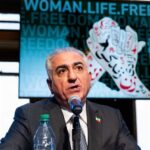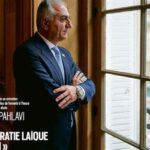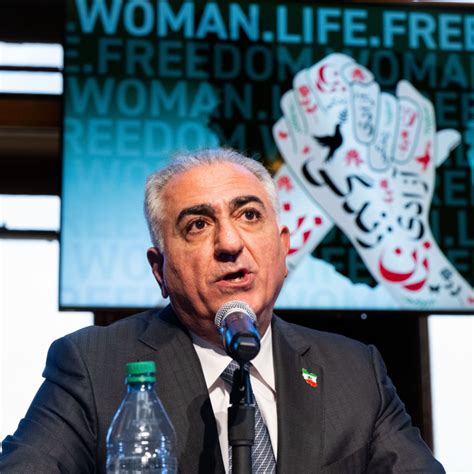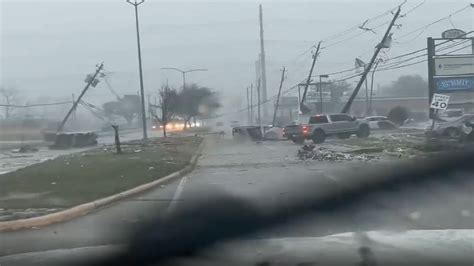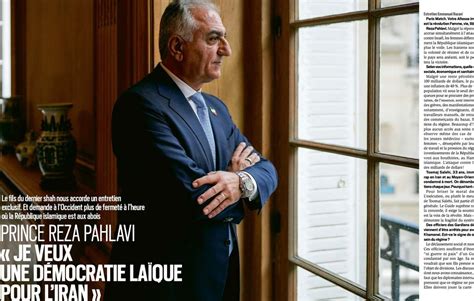
Reza Pahlavi, the son of the last Shah of Iran, has asserted that the future of Iran depends on the establishment of a secular democracy, emphasizing the need for unity among Iranians to achieve this goal. He envisions a future Iran free from the current theocratic regime, built on principles of freedom and self-determination.
Reza Pahlavi, often seen as a potential figurehead for a future Iran, continues to advocate for a fundamental shift in the country’s governance. In recent statements and interviews, he has reiterated his belief that a secular democracy is the only viable path forward for Iran, highlighting the widespread discontent with the current Islamic Republic and the desire among many Iranians for a government that respects individual rights and freedoms.
Pahlavi’s vision for a future Iran is rooted in the principles of the Universal Declaration of Human Rights, emphasizing freedom of speech, assembly, and religion. He believes that these fundamental rights are essential for creating a stable and prosperous society, and that they have been systematically suppressed under the current regime. “The future of Iran hinges on establishing a secular democracy,” Pahlavi stated, emphasizing the urgency and importance of this transition.
He has consistently called for unity among various opposition groups, both within and outside Iran, stressing that a united front is necessary to challenge the current government effectively. This call for unity extends to different ethnic and religious groups within Iran, as Pahlavi believes that a truly democratic Iran must be inclusive and representative of all its citizens.
Pahlavi acknowledges the challenges involved in transitioning to a secular democracy, particularly given the deep-seated power of the current regime and its willingness to use force to suppress dissent. However, he remains optimistic about the future, pointing to the growing frustration and discontent among Iranians as evidence that change is possible. He believes that with the right strategy and the support of the international community, a peaceful transition to a democratic Iran can be achieved.
Background and Context
Reza Pahlavi is the son of Mohammad Reza Pahlavi, the last Shah of Iran, who was overthrown in the 1979 Islamic Revolution. Since then, Pahlavi has lived in exile and has become a prominent voice for the Iranian opposition, advocating for a democratic transition in Iran. He has spent decades building relationships with political figures, activists, and organizations around the world, seeking to garner support for his vision of a free and democratic Iran.
The Islamic Revolution of 1979 brought about a radical transformation of Iranian society, replacing the monarchy with an Islamic Republic based on the principles of Shia Islam. The new regime, led by Ayatollah Ruhollah Khomeini, implemented a strict interpretation of Islamic law, which has had a profound impact on all aspects of Iranian life, from politics and economics to social and cultural norms.
Over the years, the Islamic Republic has faced numerous challenges, including economic sanctions, political unrest, and international isolation. Despite these challenges, the regime has remained in power, largely due to its control over the country’s security forces and its ability to suppress dissent. However, there is growing evidence that the regime’s legitimacy is waning, as more and more Iranians express their dissatisfaction with the status quo.
Pahlavi’s Advocacy for Secular Democracy
Reza Pahlavi’s advocacy for a secular democracy is based on the belief that religion and politics should be separate, and that the government should not impose any particular religious beliefs on its citizens. He argues that a secular democracy is the best way to protect individual rights and freedoms, and to ensure that all citizens are treated equally under the law.
“We are not looking to replace one form of dictatorship with another,” Pahlavi has stated, emphasizing the importance of establishing a system of government that is accountable to the people and respects their fundamental rights. He believes that a secular democracy is the only way to achieve this goal, as it provides a framework for protecting individual liberties and ensuring that the government is responsive to the needs of its citizens.
Pahlavi’s vision for a future Iran includes a constitutional monarchy or a republic, but emphasizes that the specific form of government should be determined by the Iranian people through a free and fair referendum. He has repeatedly stated that he has no personal ambition to rule Iran, and that his only goal is to help the Iranian people achieve their aspirations for freedom and democracy.
The Role of the International Community
Reza Pahlavi has consistently called on the international community to support the Iranian people in their struggle for freedom and democracy. He believes that the international community has a moral obligation to stand up for human rights and to hold the Iranian regime accountable for its abuses.
He has urged foreign governments to impose sanctions on Iranian officials who are responsible for human rights violations, and to provide support for Iranian civil society organizations that are working to promote democracy and human rights. He has also called on the international community to isolate the Iranian regime diplomatically, and to refuse to engage in any business dealings that could benefit the regime financially.
Pahlavi believes that the international community can play a crucial role in helping to bring about a peaceful transition to democracy in Iran, but that it must act decisively and with a clear sense of purpose. He has warned that if the international community fails to act, the Iranian regime will continue to repress its own people and to pose a threat to regional and global security.
Challenges and Obstacles
The path to a secular democracy in Iran is fraught with challenges and obstacles. The current regime has a firm grip on power, and it is willing to use force to suppress any challenge to its authority. The regime also benefits from the support of a network of loyalists and beneficiaries who have a vested interest in maintaining the status quo.
In addition, there are divisions within the Iranian opposition, which make it difficult for them to unite and present a credible alternative to the current regime. Some opposition groups advocate for a complete overhaul of the political system, while others are more moderate and favor gradual reforms. These divisions have hampered the opposition’s ability to mobilize popular support and to coordinate their activities.
Despite these challenges, Reza Pahlavi remains optimistic about the future. He believes that the growing discontent among Iranians, coupled with the increasing pressure from the international community, will eventually lead to a tipping point, at which the regime will no longer be able to maintain its grip on power. He is confident that when that day comes, the Iranian people will be ready to embrace a new era of freedom and democracy.
Economic Factors and Social Unrest
The economic situation in Iran has deteriorated significantly in recent years, due in part to international sanctions and mismanagement by the government. The country is facing high inflation, unemployment, and poverty, which has fueled social unrest and discontent.
Many Iranians blame the government for the country’s economic woes, accusing it of corruption, inefficiency, and a lack of accountability. They argue that the government’s policies have enriched a small elite while leaving the majority of the population struggling to make ends meet.
The economic crisis has had a particularly devastating impact on young people, who are facing limited opportunities for education and employment. Many young Iranians are disillusioned with the current system and are looking for a way to create a better future for themselves. This has led to increased participation in protests and other forms of activism.
The Role of Social Media
Social media has played a significant role in facilitating communication and organizing protests in Iran. Despite government efforts to censor the internet, many Iranians have found ways to circumvent these restrictions and access social media platforms such as Twitter, Facebook, and Instagram.
Social media has allowed Iranians to share information about protests and other events, to organize demonstrations, and to connect with like-minded individuals. It has also provided a platform for Iranians to express their views and to challenge the government’s narrative.
The government has responded to the growing use of social media by increasing its censorship efforts and by attempting to monitor and control online activity. However, these efforts have been largely unsuccessful, as Iranians have continued to find ways to use social media to communicate and organize.
The Future of Iran
The future of Iran remains uncertain, but there are several possible scenarios that could unfold in the coming years. One scenario is that the current regime will be able to maintain its grip on power, despite the growing discontent among Iranians and the increasing pressure from the international community. In this scenario, the regime would likely continue to repress dissent, to resist calls for reform, and to pursue its own foreign policy agenda.
Another scenario is that the regime will be overthrown in a popular uprising, similar to the Arab Spring revolutions. In this scenario, the Iranian people would rise up against the government and demand a transition to democracy. This could lead to a period of instability and uncertainty, but it could also pave the way for a new era of freedom and democracy in Iran.
A third scenario is that the regime will gradually reform itself, under pressure from internal and external forces. In this scenario, the government would implement a series of reforms aimed at addressing the country’s economic and political problems. This could lead to a more open and democratic society, but it would also require a willingness on the part of the regime to compromise and to share power.
Reza Pahlavi hopes for the second scenario, a transition to a secular democracy, but acknowledges the complexities and potential pitfalls involved. He remains committed to working with all Iranians who share his vision of a free and democratic Iran, and to supporting their efforts to bring about a peaceful and democratic transition.
Pahlavi’s Call for Unity
A key element of Pahlavi’s strategy is his consistent call for unity among the diverse segments of the Iranian opposition. He recognizes that a fractured opposition is easily exploited by the regime, and that a united front is essential for achieving meaningful change.
He has reached out to various political groups, ethnic minorities, and religious communities, seeking to build a broad coalition that can challenge the current government effectively. He emphasizes the importance of setting aside differences and focusing on shared goals, such as freedom, democracy, and human rights.
Pahlavi’s call for unity has resonated with many Iranians, who are tired of the divisions and infighting that have plagued the opposition for years. However, building a truly united front remains a challenge, as there are deep-seated differences and historical grievances that must be overcome.
The Importance of Human Rights
Reza Pahlavi has consistently emphasized the importance of human rights in his vision for a future Iran. He believes that respect for human rights is essential for creating a just and equitable society, and that the government should be held accountable for its treatment of its citizens.
He has condemned the Iranian regime’s human rights abuses, including its use of torture, arbitrary detention, and unfair trials. He has called on the international community to hold the regime accountable for these abuses and to demand that it respect the human rights of all Iranians.
Pahlavi’s commitment to human rights is rooted in his belief that all people are created equal and that they are entitled to certain fundamental rights, regardless of their race, religion, or political beliefs. He believes that a future Iran must be a society where these rights are protected and where all citizens are treated with dignity and respect.
The Role of Women
The role of women in Iranian society is a key focus of Reza Pahlavi’s vision for a future Iran. He believes that women should have equal rights and opportunities, and that they should be able to participate fully in all aspects of society.
He has criticized the Iranian regime’s discriminatory policies against women, including its restrictions on their freedom of movement, their access to education and employment, and their ability to participate in politics. He has called for these policies to be repealed and for women to be given the same rights and opportunities as men.
Pahlavi recognizes that women have played a vital role in the Iranian opposition movement, and that they will be essential to building a future Iran that is free, democratic, and just. He is committed to working with women leaders and activists to ensure that their voices are heard and that their rights are protected.
The Economic Future of Iran
The economic future of Iran is closely tied to its political future. Reza Pahlavi believes that a transition to a secular democracy is essential for creating a stable and prosperous economy.
He has criticized the Iranian regime’s economic policies, which he says have led to corruption, inefficiency, and a lack of investment. He believes that a future Iran should embrace free market principles, attract foreign investment, and create a business-friendly environment.
Pahlavi recognizes that Iran has vast natural resources and a highly educated population, which could be used to build a thriving economy. However, he believes that these resources can only be fully utilized if the country is governed by a democratic and accountable government.
The Geopolitical Implications
The future of Iran has significant geopolitical implications for the region and the world. The Iranian regime’s foreign policy has been a source of tension and instability in the Middle East, and its nuclear program has raised concerns about proliferation.
Reza Pahlavi believes that a transition to a secular democracy in Iran would have a positive impact on regional and global security. He argues that a democratic Iran would be more likely to cooperate with the international community, to respect international law, and to promote peace and stability in the region.
He is committed to working with other countries to address the challenges facing the Middle East, including terrorism, extremism, and sectarian violence. He believes that a democratic Iran can play a constructive role in building a more peaceful and prosperous future for the region.
Conclusion
Reza Pahlavi’s vision for a secular democracy in Iran represents a hopeful alternative to the current regime. While the path to achieving this vision is fraught with challenges, Pahlavi remains optimistic that the Iranian people will ultimately prevail in their struggle for freedom and democracy. His consistent advocacy, his call for unity, and his commitment to human rights have made him a prominent voice for the Iranian opposition, and his efforts continue to inspire hope for a brighter future for Iran. The transition to a secular democracy, as envisioned by Pahlavi, would require not only a change in government but also a fundamental shift in the country’s political culture, one that embraces tolerance, pluralism, and respect for individual rights. The future of Iran hinges on the ability of the Iranian people to overcome the obstacles in their path and to build a society that is truly free, democratic, and just.
Frequently Asked Questions (FAQ)
-
What is Reza Pahlavi’s vision for the future of Iran?
Reza Pahlavi envisions a future Iran governed by a secular democracy, where the government is separate from religious institutions, and individual rights and freedoms are protected. He emphasizes the importance of free and fair elections, freedom of speech, and respect for human rights. “The future of Iran hinges on establishing a secular democracy,” he asserts, highlighting its crucial role.
-
What is Reza Pahlavi’s background and why is he considered a prominent figure in the Iranian opposition?
Reza Pahlavi is the son of the last Shah of Iran, Mohammad Reza Pahlavi, who was overthrown in the 1979 Islamic Revolution. He has lived in exile since then and has become a leading voice for the Iranian opposition due to his lineage, his advocacy for democracy, and his efforts to unite opposition groups both inside and outside Iran. He actively engages with international communities, seeking support for his vision of a democratic Iran.
-
What are the main challenges to achieving a secular democracy in Iran?
The main challenges include the entrenched power of the current Islamic Republic regime, its willingness to suppress dissent, divisions within the Iranian opposition, and the complex geopolitical landscape. The regime’s control over security forces and its ideological grip on certain segments of the population also pose significant obstacles.
-
What role does Reza Pahlavi see for the international community in supporting a democratic transition in Iran?
Reza Pahlavi calls on the international community to support the Iranian people in their struggle for freedom and democracy by imposing sanctions on Iranian officials responsible for human rights violations, providing support for Iranian civil society organizations, and isolating the Iranian regime diplomatically. He believes international pressure is crucial for creating an environment conducive to change.
-
What is Reza Pahlavi’s stance on the Iranian regime’s human rights record?
Reza Pahlavi strongly condemns the Iranian regime’s human rights abuses, including the use of torture, arbitrary detention, and unfair trials. He advocates for the protection of human rights and fundamental freedoms for all Iranians and calls for accountability for those responsible for human rights violations. He views respect for human rights as a cornerstone of a future democratic Iran.
-
How does Reza Pahlavi view the economic situation in Iran, and what economic policies does he advocate for a future Iran?
Reza Pahlavi views the economic situation in Iran as dire, attributing it to government mismanagement, corruption, and international sanctions. He advocates for free market principles, attracting foreign investment, and creating a business-friendly environment in a future Iran to stimulate economic growth and improve the living standards of the Iranian people.
-
What is Reza Pahlavi’s position on the role of women in Iranian society?
Reza Pahlavi believes that women should have equal rights and opportunities in all aspects of Iranian society. He criticizes the discriminatory policies against women under the current regime and advocates for their full participation in politics, economics, and social life. He sees the empowerment of women as essential for a progressive and democratic Iran.
-
How does Reza Pahlavi address the issue of ethnic and religious minorities in Iran?
Reza Pahlavi emphasizes the importance of inclusivity and equal rights for all ethnic and religious minorities in Iran. He calls for a society where all citizens are treated with dignity and respect, regardless of their background or beliefs. He believes a truly democratic Iran must protect the rights and freedoms of all its diverse communities.
-
What are some of the potential risks and challenges associated with a transition to a secular democracy in Iran, as identified by observers and analysts?
Potential risks and challenges include the possibility of instability and violence during a transition, the rise of extremist groups, the interference of foreign powers, and the difficulty of building consensus among diverse political factions. Ensuring a smooth transition and establishing strong democratic institutions would be crucial for avoiding these pitfalls.
-
How does Reza Pahlavi see his personal role in a future Iran? Does he aspire to be a political leader?
Reza Pahlavi has stated that he has no personal ambition to rule Iran. His primary goal is to facilitate a democratic transition and empower the Iranian people to choose their own form of government through a free and fair referendum. He sees his role as a facilitator and advocate for democracy, rather than a political leader seeking power.
-
What are some of the specific human rights issues that Reza Pahlavi frequently highlights when discussing Iran?
Reza Pahlavi frequently highlights issues such as freedom of speech, freedom of assembly, freedom of religion, the right to a fair trial, and the abolition of torture and other cruel and inhuman punishments. He also emphasizes the importance of protecting the rights of political prisoners and ensuring that all Iranians are treated equally under the law.
-
What strategies does Reza Pahlavi advocate for in order to counter the Iranian regime’s propaganda and censorship efforts?
Reza Pahlavi advocates for promoting independent media, supporting Iranian journalists and activists who are working to expose the truth, and using social media and other technologies to bypass censorship and provide Iranians with access to uncensored information. He also calls on the international community to condemn the Iranian regime’s propaganda efforts and to support efforts to promote media freedom in Iran.
-
How does Reza Pahlavi view the role of the Iranian diaspora in supporting a democratic transition in Iran?
Reza Pahlavi sees the Iranian diaspora as playing a crucial role in supporting a democratic transition in Iran by advocating for human rights and democracy, providing financial and technical assistance to opposition groups, and raising awareness about the situation in Iran among international policymakers and the public. He emphasizes the importance of unity and collaboration among the various segments of the Iranian diaspora.
-
What are Reza Pahlavi’s views on Iran’s nuclear program and its impact on regional and global security?
Reza Pahlavi has expressed concerns about Iran’s nuclear program and its potential to destabilize the region and pose a threat to global security. He believes that a democratic Iran would be more likely to adhere to international norms and treaties and to pursue a peaceful foreign policy. He supports efforts to prevent Iran from developing nuclear weapons, but he also emphasizes the importance of addressing the underlying causes of the conflict and promoting dialogue and cooperation among all parties.
-
How does Reza Pahlavi see the relationship between Iran and its neighboring countries in a future democratic Iran?
Reza Pahlavi envisions a future Iran that is at peace with its neighbors and that plays a constructive role in promoting regional stability and cooperation. He believes that a democratic Iran would be more likely to respect the sovereignty and territorial integrity of other countries and to resolve disputes through peaceful means. He also emphasizes the importance of building strong economic and cultural ties with neighboring countries.
-
What impact does Reza Pahlavi think the widespread use of social media and access to information has on the Iranian population’s perception of the current regime?
Reza Pahlavi believes that the widespread use of social media and access to information has significantly eroded the legitimacy of the current regime. Exposure to alternative viewpoints and uncensored news has allowed Iranians to see the regime’s propaganda for what it is, fueling discontent and a desire for change. It has also empowered individuals to organize and coordinate protests, making it harder for the regime to control the narrative.
-
How does Reza Pahlavi perceive the current state of religious freedom within Iran, and what changes does he propose?
Reza Pahlavi perceives religious freedom in Iran as severely restricted under the current theocratic regime. He proposes the establishment of a secular government that guarantees freedom of religion for all, regardless of their faith or beliefs. This would entail removing state control over religious institutions and allowing individuals to practice their faith without fear of persecution or discrimination.
-
What role does Reza Pahlavi envision for a modernized and reformed Iranian military in a future democratic Iran?
Reza Pahlavi envisions a modernized and reformed Iranian military that is professional, accountable, and committed to defending the country’s borders and protecting its citizens. He believes that the military should be non-political and subordinate to civilian control, ensuring that it serves the interests of the nation as a whole, rather than any particular political faction.
-
What are the main economic and social issues driving discontent in Iran today, according to Reza Pahlavi?
According to Reza Pahlavi, the main economic issues driving discontent in Iran include widespread corruption, economic mismanagement, high unemployment, and rising inflation. Social issues contributing to unrest include a lack of personal freedoms, suppression of dissent, and limited opportunities for young people. He believes that addressing these issues is crucial for stabilizing the country and building a more just and equitable society.
-
In what ways has Reza Pahlavi been actively engaging with international governments and organizations to further his vision for Iran?
Reza Pahlavi actively engages with international governments and organizations by giving speeches, participating in conferences, meeting with political leaders, and advocating for sanctions against Iranian officials responsible for human rights abuses. He seeks to raise awareness about the situation in Iran, build support for a democratic transition, and coordinate efforts to hold the Iranian regime accountable for its actions. He also works with international human rights organizations to document and expose human rights violations in Iran.
